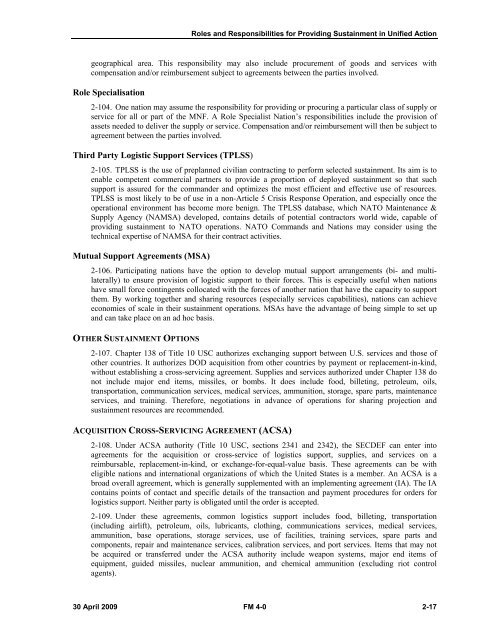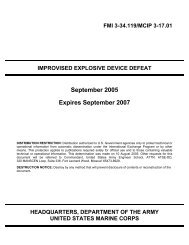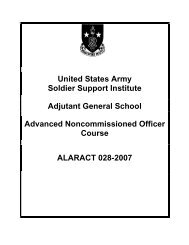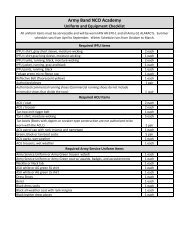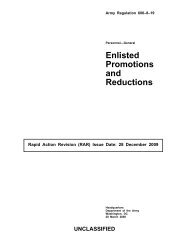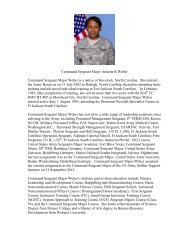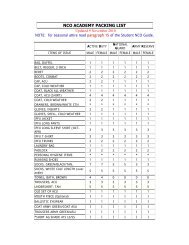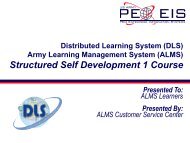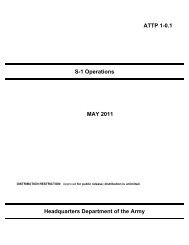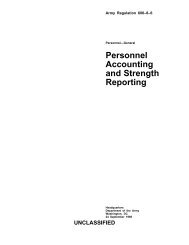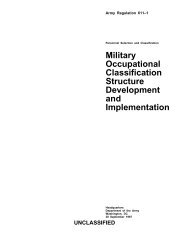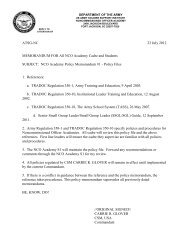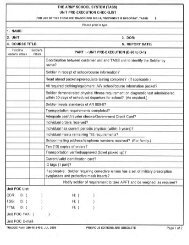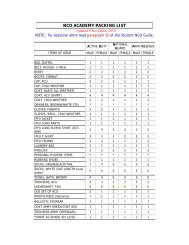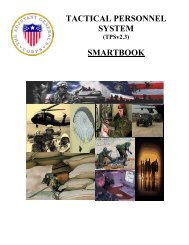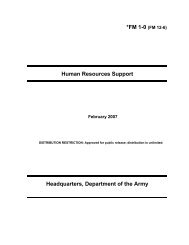FM 4-0, Sustainment - GlobalSecurity.org
FM 4-0, Sustainment - GlobalSecurity.org
FM 4-0, Sustainment - GlobalSecurity.org
- No tags were found...
You also want an ePaper? Increase the reach of your titles
YUMPU automatically turns print PDFs into web optimized ePapers that Google loves.
Roles and Responsibilities for Providing <strong>Sustainment</strong> in Unified Actiongeographical area. This responsibility may also include procurement of goods and services withcompensation and/or reimbursement subject to agreements between the parties involved.Role Specialisation2-104. One nation may assume the responsibility for providing or procuring a particular class of supply orservice for all or part of the MNF. A Role Specialist Nation’s responsibilities include the provision ofassets needed to deliver the supply or service. Compensation and/or reimbursement will then be subject toagreement between the parties involved.Third Party Logistic Support Services (TPLSS)2-105. TPLSS is the use of preplanned civilian contracting to perform selected sustainment. Its aim is toenable competent commercial partners to provide a proportion of deployed sustainment so that suchsupport is assured for the commander and optimizes the most efficient and effective use of resources.TPLSS is most likely to be of use in a non-Article 5 Crisis Response Operation, and especially once theoperational environment has become more benign. The TPLSS database, which NATO Maintenance &Supply Agency (NAMSA) developed, contains details of potential contractors world wide, capable ofproviding sustainment to NATO operations. NATO Commands and Nations may consider using thetechnical expertise of NAMSA for their contract activities.Mutual Support Agreements (MSA)2-106. Participating nations have the option to develop mutual support arrangements (bi- and multilaterally)to ensure provision of logistic support to their forces. This is especially useful when nationshave small force contingents collocated with the forces of another nation that have the capacity to supportthem. By working together and sharing resources (especially services capabilities), nations can achieveeconomies of scale in their sustainment operations. MSAs have the advantage of being simple to set upand can take place on an ad hoc basis.OTHER SUSTAINMENT OPTIONS2-107. Chapter 138 of Title 10 USC authorizes exchanging support between U.S. services and those ofother countries. It authorizes DOD acquisition from other countries by payment or replacement-in-kind,without establishing a cross-servicing agreement. Supplies and services authorized under Chapter 138 donot include major end items, missiles, or bombs. It does include food, billeting, petroleum, oils,transportation, communication services, medical services, ammunition, storage, spare parts, maintenanceservices, and training. Therefore, negotiations in advance of operations for sharing projection andsustainment resources are recommended.ACQUISITION CROSS-SERVICING AGREEMENT (ACSA)2-108. Under ACSA authority (Title 10 USC, sections 2341 and 2342), the SECDEF can enter intoagreements for the acquisition or cross-service of logistics support, supplies, and services on areimbursable, replacement-in-kind, or exchange-for-equal-value basis. These agreements can be witheligible nations and international <strong>org</strong>anizations of which the United States is a member. An ACSA is abroad overall agreement, which is generally supplemented with an implementing agreement (IA). The IAcontains points of contact and specific details of the transaction and payment procedures for orders forlogistics support. Neither party is obligated until the order is accepted.2-109. Under these agreements, common logistics support includes food, billeting, transportation(including airlift), petroleum, oils, lubricants, clothing, communications services, medical services,ammunition, base operations, storage services, use of facilities, training services, spare parts andcomponents, repair and maintenance services, calibration services, and port services. Items that may notbe acquired or transferred under the ACSA authority include weapon systems, major end items ofequipment, guided missiles, nuclear ammunition, and chemical ammunition (excluding riot controlagents).30 April 2009 <strong>FM</strong> 4-0 2-17


